
What ER doctors avoid to stay safe on July Fourth
Emergency room (ER) doctors have seen it all when it comes to Independence Day-related accidents and injuries, from severe sunburns to fireworks injuries. According to the U.S. Consumer Product Safety Commission (CPSC), over 10,000 people were treated for fireworks injuries in 2022. So, how can you lower your risk and avoid becoming another Fourth of July ER statistic?
Whether you’re watching a fireworks display, enjoying a barbecue or just having fun, following a doctor’s lead will help keep you and your loved ones safe this July Fourth. We asked doctors to reveal the things they would never do during this holiday weekend.
Is July Really the Most Dangerous Month to Go to the Hospital?
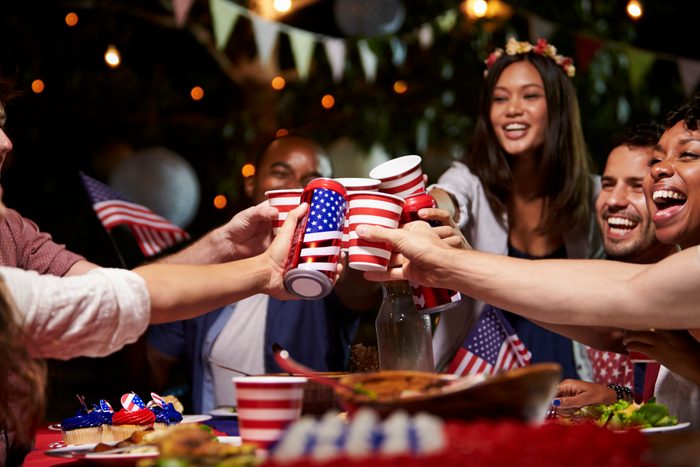
1. Drink alcohol and shoot off fireworks
This is such a dangerous combination, says Robert Glatter, MD, an emergency physician with Lenox Hill Hospital, New York City. “Many patients we see are impaired or distracted when they make the decision to set off a dangerous explosive device. This is a recipe for disaster,” he says. “Drinking alcohol makes people do things they wouldn’t normally do and these risk-taking behaviors can result in serious injuries to eyes, hands, fingers, the face, as well as the legs when fireworks are involved.”

2. Use fireworks without protective eyewear
If you are going to shoot fireworks (and this should not be a decision entered into lightly if you are not a pro), wear goggles to protect your eyes, Dr. Glatter says. “Eye injuries are one of the most feared complications of setting off fireworks,” he says. “Fireworks contain sulfur, charcoal, and gunpowder, and their red-hot fragments—which can reach over 1,300 degrees Fahrenheit—may cause burns, tears, and lacerations of the eyes, which can ultimately lead to blindness.”

3. Not take every possible precaution before using fireworks
This starts with knowing whether fireworks are even legal in your area. If they are, and you are using fireworks, don’t place any part of your body directly over the device when lighting the fuse, Dr. Glatter says. “Back up to a safe distance immediately after lighting a firework and have a pail of water or standard garden hose connected to a water source in case of a fire.” Don’t pick up or try to light firecrackers that have not fully ignited, he says.
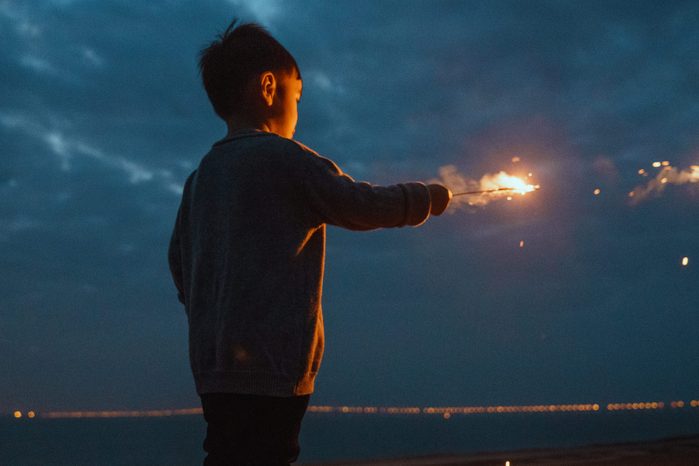
4. Let small children hold sparklers
Sparklers may seem safer than traditional fireworks, and kids are naturally drawn to their color and twinkle, but they should not hold or touch them, says Steven Sandoval, MD, associate professor of surgery and medical director of the Suffolk County Volunteer Firefighters Burn Center at Stony Brook University Hospital in Stony Brook, New York. “Sparklers can reach as high as 2,000 to 3,000 degrees, and kids may run around with them or hold them too close to their face or throw them if they get scared.”
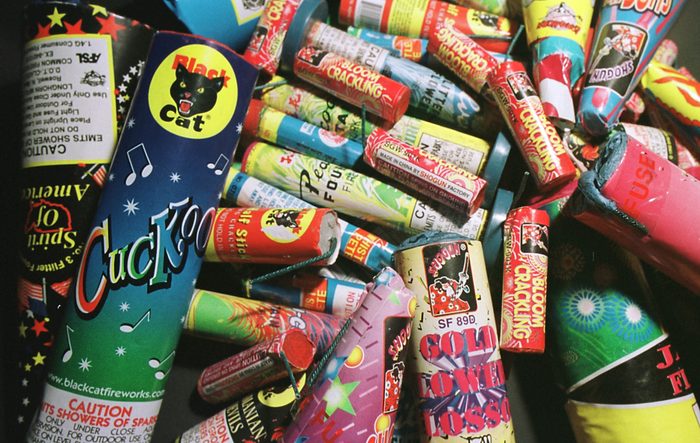
5. Buy or use fireworks sold in brown paper bags
These types of fireworks are often for professionals only, Dr. Glatter says. Not all fireworks are created equal, he explains; while all of them can be dangerous, some are much more dangerous than others. “Sparklers and firecrackers account for the bulk of injuries, but we also see injuries from bottle rockets and Roman candles.” (Bottle rockets are firecrackers attached to a stick to control their launch. Roman candles eject stars or exploding shells.) Some of the worst offenders are homemade firecrackers, says Dr. Sandoval. They require black powder and gun powder, the latter of which can explode rapidly when it comes in contact with sparks or any flames, he says.
6 Exercise Habits You Should Change Before Summer, Says a Trainer & Former California Firefighter
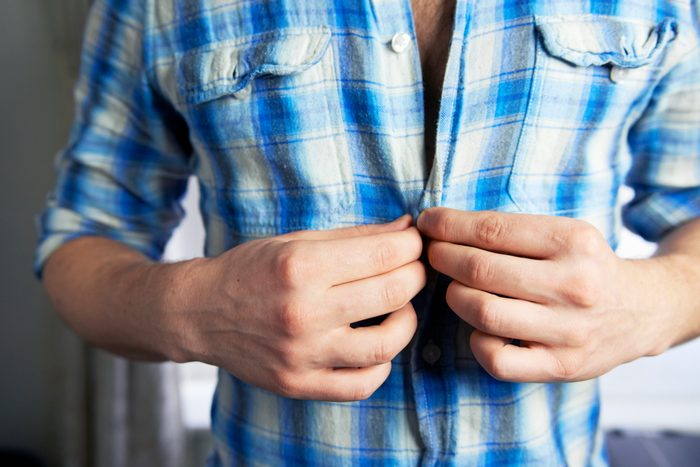
6. Not dress appropriately for any firework display
It’s not just the people who are shooting fireworks that may find themselves in harm’s way, Dr. Glatter says. “Bystanders may also be at significant risk from metal fragments, chemicals or dust released by the fireworks,” he explains. “It’s important to wear a light jacket or long sleeves with a sweat-wicking material to protect yourself.” If you have asthma or an underlying lung condition, make sure you have your inhaler handy as dust from the fireworks could potentially trigger an asthma attack.
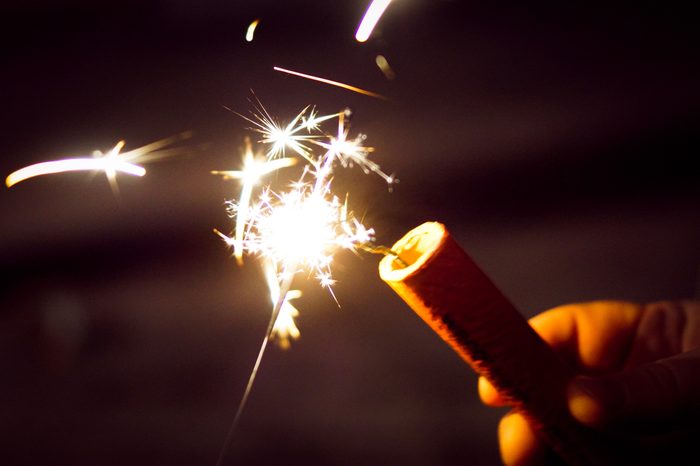
7. Carry unlit fireworks in their pocket
Bad move, cautions Dr. Glatter. Don’t place fireworks in your pockets or on your body since there is always the potential that a nearby spark can cause them to go off. “This can cause devastating injuries to your extremities and genital organs.”
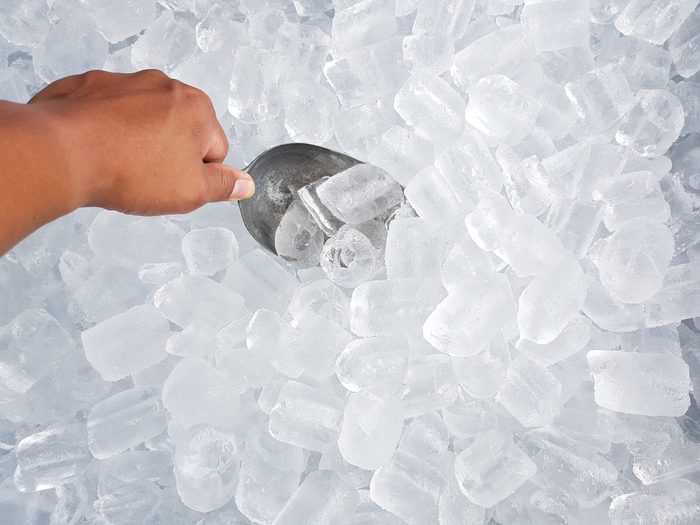
8. Ice a burn
The notion that putting ice on a burn can help is an old wives’ tale, says Lisa A. Moreno, MD, president of the American Academy of Emergency Medicine and professor of emergency medicine, director of research and director of diversity for the section of emergency medicine at Louisiana State University Health Sciences Center New Orleans. “It actually causes your blood vessels to constrict so the heat will go deeper into your tissue,” she says. “Apply room-temperature water to your burn instead. Applying butter, lard or oil will also make burns worse because the oil absorbs heat faster than water, so it keeps the area hotter and more uncomfortable. “If you get a blister with a burn, go to the ER,” she says. “Any burns to your face, neck, or hands should be seen too [because] if they aren’t treated properly, you may have problems down the road, including trouble moving your neck or fingers.”
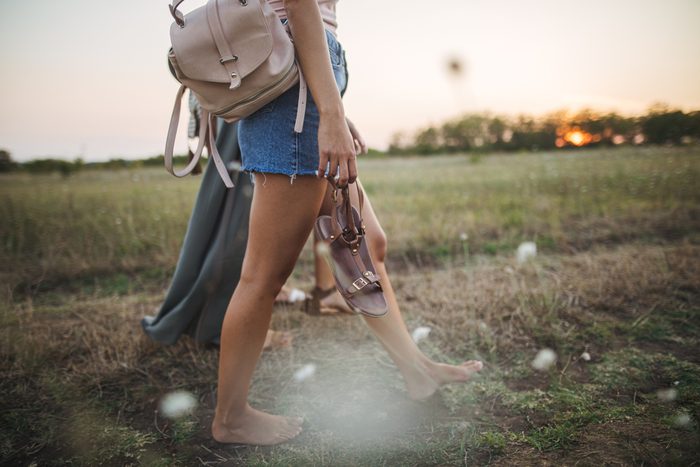
9. Walk barefoot through the park
Independence Day picnics in parks and other public spaces are a popular way to celebrate this holiday, but kicking off your shoes—or letting children run barefoot—is risky, even if it’s a hot day, says Alan L. Nager, MD, director, division of emergency and transport medicine at Children’s Hospital Los Angeles.
“Sometimes people dump hot charcoal from a portable grill in the grass after a barbecue,” he says. “We see a fair share of foot burns each year when kids accidentally step on hot coals,” he says. There are other risks lurking in the grass too, including broken glass and bees just waiting to sting.
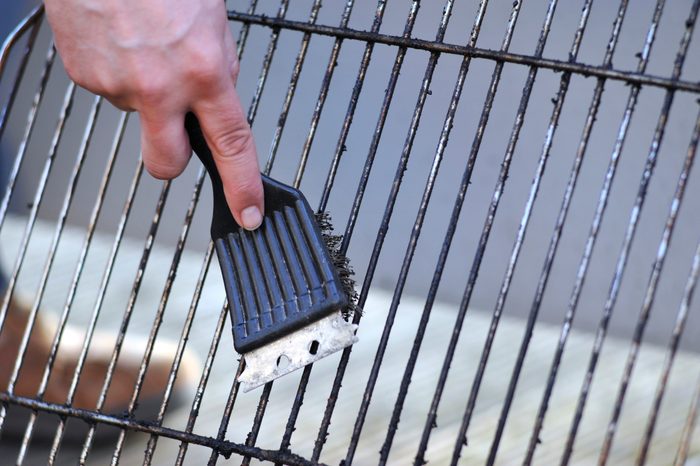
10. Use wire bristle brushes to clean the grill
This is risky because the brush’s wire bristles can break off, remain on the grill grate and end up in your food and potentially get lodged in your stomach or intestines, causing serious problems. Instead, the CPSC advises people to clean their grills with a ball of aluminum foil or nylon brushes instead of wire grill brushes.
9 Mental Health Reasons You Actually Need a Good Cookout, from Therapists
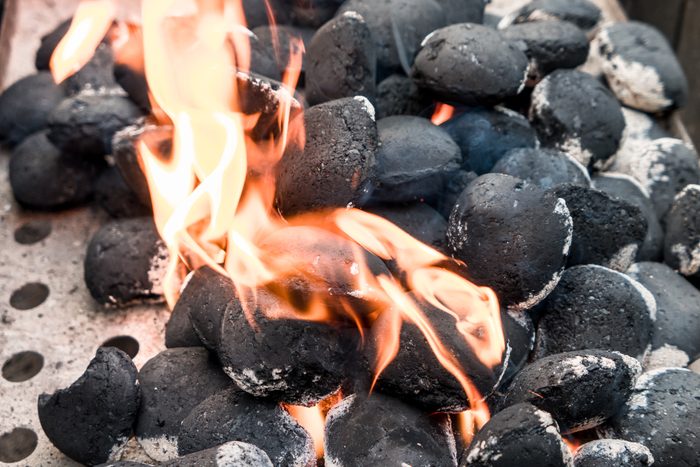
11. Squirt lighter fluid on lit charcoal
If you don’t think your charcoal is hot enough to start grilling, the worst thing you can do is squirt lighter fluid on it. “There will be a big flame,” says Dr. Moreno. “Each year people lose their eyebrows or burn their faces and hair or have their clothing set on fire when they do this.” Give the charcoal time to heat up, she suggests.
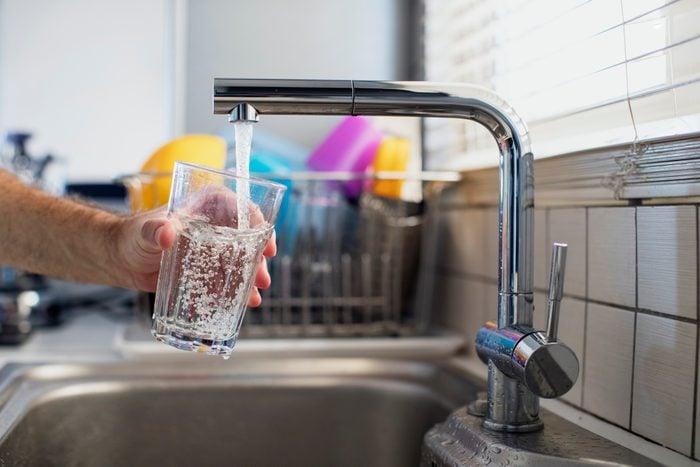
12. Go too long without drinking water
It’s easy to get dehydrated under the sun, and alcohol can make it even easier, says Dr. Sandoval. “Drink water or another hydrating liquid drink for every alcoholic one,” he says. Make sure your kids are drinking water too.
The 3 Best Hydrating Beverages That Aren’t Water, from a Certified Sports Dietitian
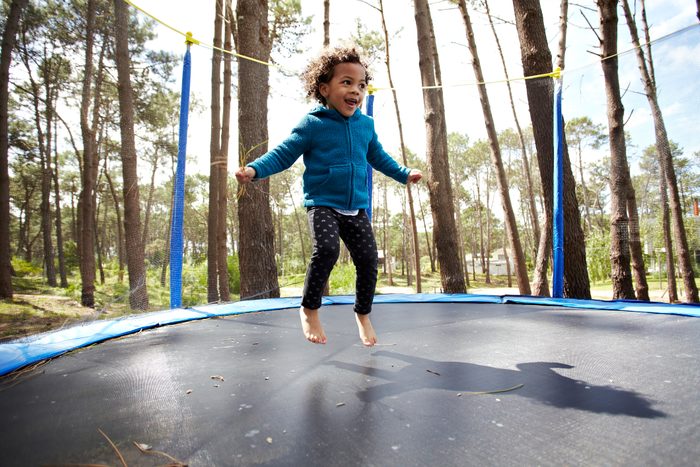
13. Let children jump on a trampoline without helmets
This may be a tough sell, but getting your kids to wear a helmet while jumping on a trampoline could save their lives, Dr. Nager says. “Trampolines are extraordinarily dangerous and can result in sprains and fractures in the arms or legs as well as head and neck injuries from improper landing,” he explains. There were more than 300,000 medically treated trampoline injuries in 2018, according to the American Academy of Orthopedic Surgeons. Supervision is also important, he says. “There should be a designated adult who is not drinking or reading a newspaper that is supervising every second a child is jumping on a trampoline.”
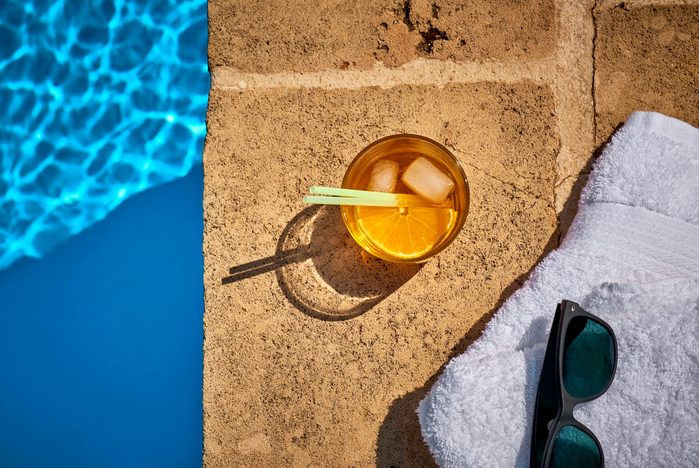
14. Swim while intoxicated or alone
These are big no-no’s, warns Dr. Moreno. “I wouldn’t swim alone or let kids swim alone,” she says. “You should always have a partner in the water with you, and there should always be an adult supervising a child in the water.” Swimming while under the influence of drugs or alcohol can make you more likely to take risks and do stupid things such as diving into shallow water, she says.
5 Ways Alcohol Can Sabotage Your Weight Loss Goals, According to an Obesity Doctor
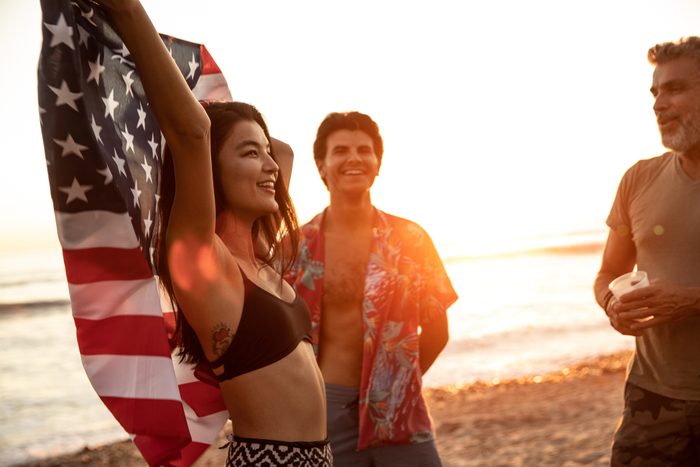
15. Spend time outside without SPF
Using sunscreen is a good idea 365 days a year. The American Academy of Dermatology recommends using broad-spectrum sunscreen with an SPF of 30 or higher that is water resistant, and reapplying it frequently.
4 Unexpected Body Parts That Are Sunscreen Musts, Says Research
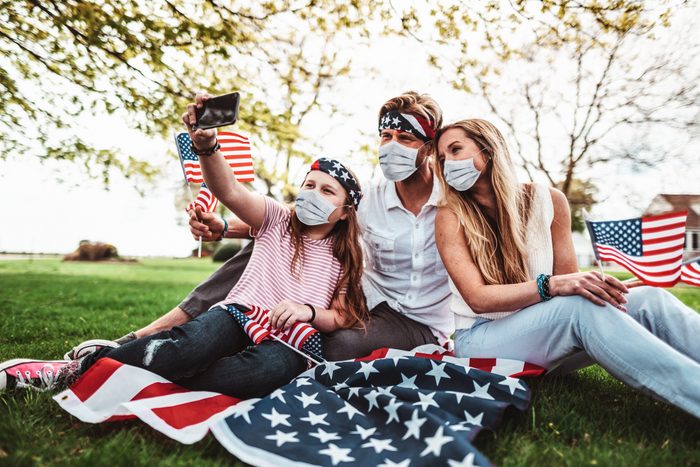
16. Forget that COVID-19 is still spreading
Though it may be widely accepted that the pandemic has ended, COVID-19 is still present, Dr. Nager says. Remember to wear a mask and practice social distancing to protect yourself and those around you, particularly those more vulnerable to infection with the coronavirus, SARS-CoV-2.
- ‘The Pillowtalk Derm’ Dr. Shereene Idriss, MD, Reveals Her #1 Rule for Gorgeous Summer Skin: ‘You Will Be Golden’
- 8 Changes Your Vagina Needs You to Make This Summer
- ‘What SPF Do I Need?’ Here’s a Dermatologist’s Reliable Method for Choosing
- Here’s What a Universal Summer Break Would Do for Everybody’s Health, Say Experts
